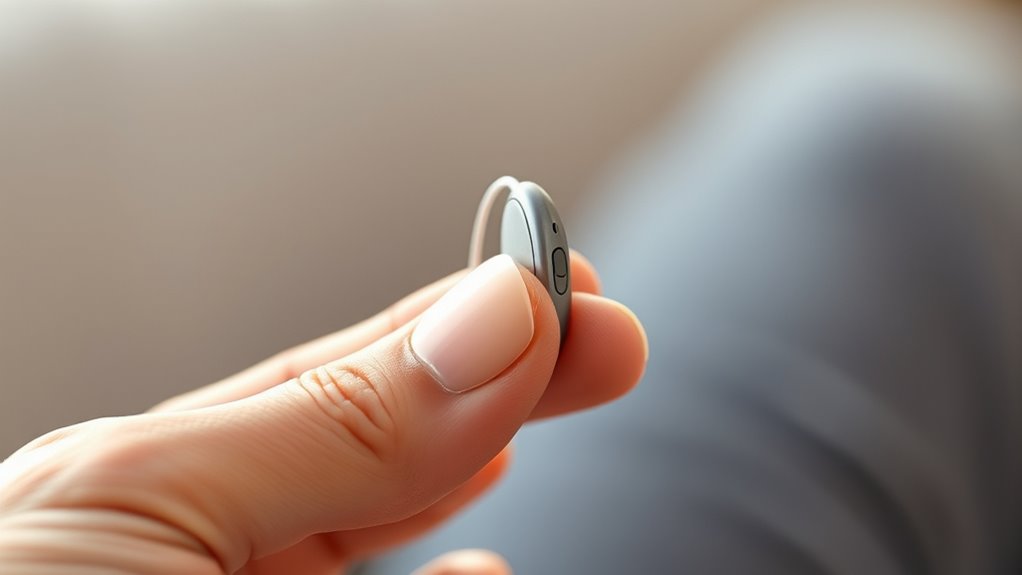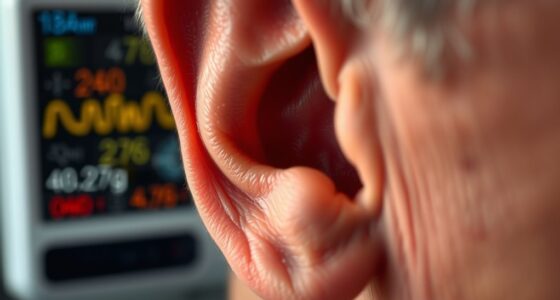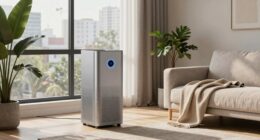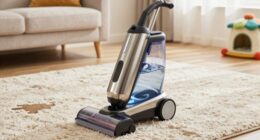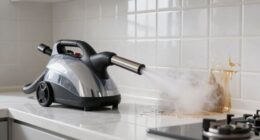Over-the-counter hearing aids can be a good option if you have mild to moderate hearing loss, especially if you’re looking for an affordable, accessible solution without visiting a specialist. They’re simple, easy to use, and suitable for common hearing issues like trouble hearing in noisy places. However, they may not be ideal for complex or sudden hearing problems. To find out if OTC devices fit your needs, explore more about their features and limitations below.
Key Takeaways
- OTC hearing aids are suitable for mild to moderate hearing loss and those seeking affordable, accessible hearing solutions.
- They are easy to purchase without a prescription but may lack personalized fitting and advanced features.
- Ideal for individuals experiencing difficulty hearing conversations in noisy settings or high-pitched sounds.
- Not recommended for profound, sudden, or complex hearing loss; professional evaluation is advised for these cases.
- Consult a healthcare professional if you notice persistent hearing difficulties, discomfort, or associated symptoms like dizziness.
Understanding OTC Hearing Aids: What Are They?
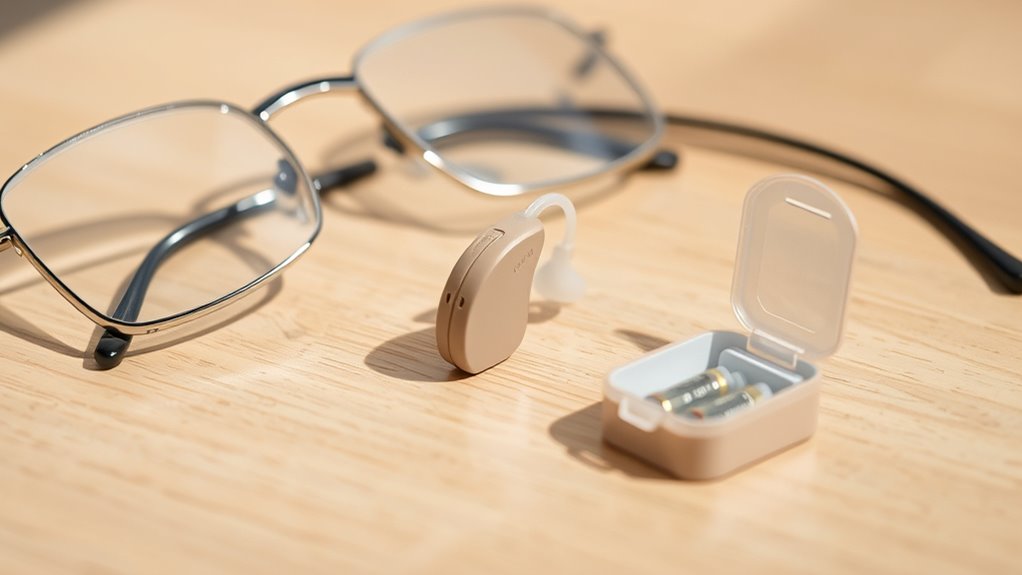
Have you ever wondered what over-the-counter (OTC) hearing aids really are? These are small electronic devices designed to help people with mild to moderate hearing loss without needing a prescription. Unlike traditional hearing aids, OTC models are available directly to consumers at pharmacies, online stores, or electronics shops. They’re usually simple to operate, often featuring adjustable settings to customize sound. You don’t need to see a specialist beforehand, which can make them more accessible and affordable. OTC hearing aids are intended to address common hearing difficulties, like understanding speech in noisy environments or hearing high-pitched sounds. They’re a convenient option if you suspect hearing loss but want to try a solution before consulting a healthcare professional. Copyright and Affiliate Disclosure policies ensure transparency regarding their sales and usage.
Comparing OTC Devices and Traditional Hearing Aids
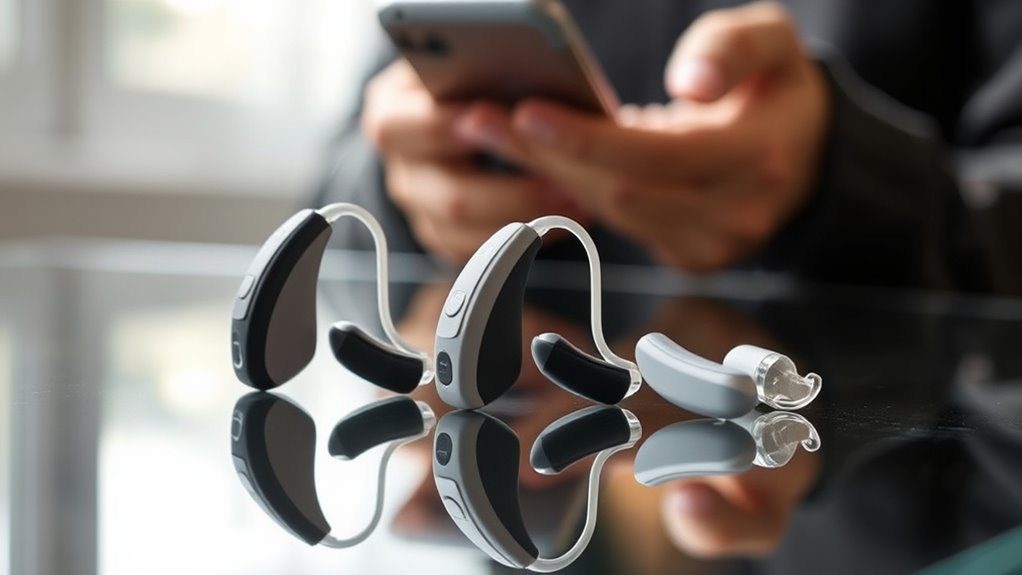
When comparing OTC devices to traditional hearing aids, you’ll notice differences in cost and how easy they are to access. Performance and customization options also vary, affecting how well each suits your specific needs. Understanding these points helps you make a more informed choice. Additionally, considering best hearing aid options can guide you toward solutions that combine affordability with effective hearing support.
Cost and Accessibility Differences
Over-the-counter (OTC) hearing aids generally cost considerably less than traditional devices, making them more accessible for many people. You can expect to pay a fraction of the price, often ranging from a few hundred to a thousand dollars, compared to several thousand for professional-grade hearing aids. This lower cost removes financial barriers, allowing more individuals to seek help without the need for costly audiologist visits or custom fittings. OTC devices are available over the counter, so you can purchase them online or in stores without a prescription. This ease of access means you don’t have to wait for appointments or undergo extensive evaluations, making hearing assistance quicker and more convenient. Additionally, the cost and accessibility differences can encourage more people to take proactive steps toward managing their hearing health. Overall, OTC hearing aids offer a more budget-friendly and readily available option for those with mild to moderate hearing loss.
Performance and Customization
While OTC hearing aids have become more popular, they often offer less advanced performance and fewer customization options than traditional hearing aids. You might notice that OTC devices provide basic amplification suitable for mild to moderate hearing loss, but they lack the fine-tuning capabilities of custom-fitted aids. Traditional hearing aids allow audiologists to adjust settings specifically for your hearing profile, optimizing sound clarity and reducing feedback. OTC devices usually rely on preset programs or simple controls, limiting your ability to customize sound quality. If your hearing loss is complex or fluctuates, OTC models may not deliver the clarity or comfort you need. Additionally, understanding trust issues related to hearing aid performance can influence your decision. Ultimately, while OTC aids can improve hearing for some, they generally don’t match the performance and personalization offered by professionally fitted devices.
Who Can Benefit Most From OTC Hearing Aids?

People who experience mild to moderate hearing loss are the most likely to benefit from OTC hearing aids. If your hearing difficulties are noticeable but not severe, these devices can improve your daily communication and overall quality of life. Here are four groups who may find OTC hearing aids most helpful:
- People noticing trouble hearing conversations in noisy environments
- Those experiencing occasional ringing or muffled sounds
- Individuals with age-related hearing decline that’s still manageable
- Users seeking a cost-effective, accessible solution before visiting a specialist
- Understanding how hearing aid technology works can help you determine if OTC options are suitable for your needs.
If your hearing loss falls within these ranges, OTC hearing aids could be a practical option. However, if your hearing loss is profound or sudden, consulting a professional is recommended.
Potential Advantages of Over-the-Counter Options

One of the key benefits of OTC hearing aids is their accessibility and affordability, making them an attractive option for many users. You can often purchase them without a prescription or a visit to an audiologist, saving time and money. This direct-to-consumer approach means you can get hearing assistance quickly, especially if your hearing loss is mild to moderate. OTC devices are typically more affordable than traditional hearing aids, reducing financial barriers. They also offer a wider range of styles and features, giving you more choice to find a device that fits your lifestyle. Additionally, some users appreciate the privacy and convenience of buying and adjusting these aids on their own. Overall, OTC options can empower you to take control of your hearing health more easily and affordably. Cost-effective production methods contribute to making these devices more accessible and affordable for consumers.
Limitations and Risks to Consider

Despite their convenience and affordability, OTC hearing aids come with limitations and risks you should consider. First, they may not be tailored to your specific hearing loss, leading to suboptimal results. Second, improper use or fitting can cause discomfort or further hearing issues. Third, without professional guidance, you might miss underlying health problems that require medical attention. Fourth, some OTC devices might lack rigorous testing or quality control, raising concerns about durability and safety. Additionally, advancements in Intelligent Tutoring Systems demonstrate how technology can adapt to individual needs, highlighting the importance of personalized solutions. While these aids are accessible, they might not address complex hearing needs or provide the same level of effectiveness as custom solutions. Being aware of these risks helps you make an informed decision about whether OTC hearing aids suit your situation.
Factors to Assess Before Making a Purchase

Before buying an OTC hearing aid, it’s essential to evaluate several key factors to guarantee it meets your needs. First, consider your level of hearing loss. OTC devices are generally suited for mild to moderate hearing issues; if your loss is more severe, professional guidance might be necessary. Next, think about your lifestyle and daily environment. Will you need a device that performs well in noisy settings or one that’s simple to use? Battery life is also important—long-lasting batteries reduce the hassle of frequent replacements. Compatibility with your existing devices, such as smartphones, can enhance usability. Finally, assess your comfort and fit preferences, ensuring the device is not only effective but also comfortable for extended wear. These considerations help you choose an OTC hearing aid suited to your specific needs. Additionally, understanding the father-daughter bond and the importance of support can provide emotional reassurance during this decision-making process.
How to Choose the Right OTC Hearing Aid for You
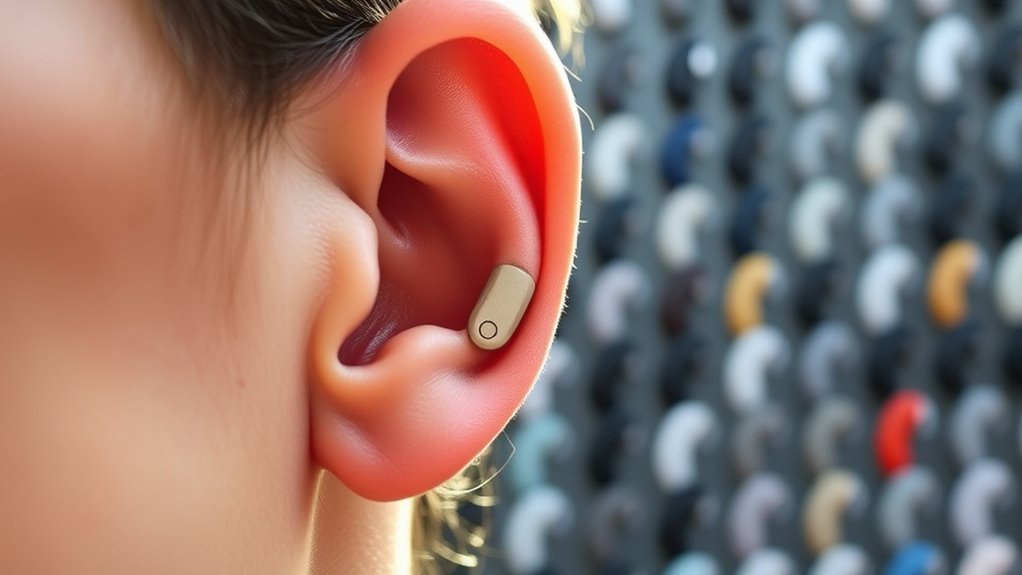
Choosing the right OTC hearing aid begins with understanding your specific needs and preferences. Consider how severe your hearing loss is and whether you need more amplification or clearer sound. Think about comfort and fit—some styles sit behind the ear, while others are in-ear. Your lifestyle matters, too; if you’re active or outdoors often, look for durable, sweat-resistant models. Finally, decide on features like volume control, noise reduction, or Bluetooth connectivity based on what enhances your daily life. Being aware of hearing aid features can help you select a device that best fits your needs and lifestyle.
Here are four key factors to guide your choice:
- Level of hearing loss
- Fit and comfort
- Lifestyle and activity level
- Desired features and technology
When to Seek Professional Advice or Evaluation

If you notice signs of hearing loss, it’s important to seek professional advice to guarantee proper evaluation. OTC devices have limitations and may not address underlying issues, so consulting a specialist can help determine the best course of action. Don’t hesitate to get expert guidance to protect your hearing health effectively. Additionally, understanding how hearing device tuning works can inform your decisions about the most suitable options for your needs.
Recognize Hearing Loss Signs
Noticing signs of hearing loss early can make a big difference in maintaining your quality of life. If you experience any of these signs, it’s time to seek professional advice:
- Struggling to follow conversations, especially in noisy places
- Frequently asking others to repeat themselves
- Turning up the volume on devices more than usual
- Feeling tired or frustrated after social interactions
These signs indicate your hearing might be declining. Recognizing them promptly helps you get the support you need and prevents further deterioration. Don’t ignore these signals — early evaluation ensures you explore all options, including hearing aids. A professional assessment can confirm your hearing status and guide you toward the best solutions. Acting early can improve your communication and overall well-being.
Understand Limitations of OTC Devices
While over-the-counter hearing aids can be a convenient option for some, they aren’t suitable for everyone or every type of hearing loss. These devices are generally designed for mild to moderate hearing issues and may not address complex or profound losses. They often lack advanced features that can tailor sound to your specific needs, and improper use might worsen your hearing health over time. If your hearing loss is sudden, worsening, or accompanied by dizziness, pain, or ringing, OTC devices might not be effective or safe. Without proper assessment, you risk not getting the necessary treatment or fitting. Recognizing these limitations helps you determine when professional guidance is essential to ensure your hearing health is properly managed.
Consult Professionals for Guidance
Seeking professional guidance is essential whenever you experience sudden changes in your hearing, persistent discomfort, or if OTC devices don’t seem to improve your hearing issues. A hearing professional can accurately diagnose your condition and recommend the best treatment. Here are when to seek help:
- You notice a sudden decrease in hearing ability.
- You experience pain or ringing that doesn’t go away.
- OTC devices aren’t providing relief or clarity.
- You feel unsteady or have balance problems related to hearing loss.
Visiting an audiologist or ENT specialist ensures your hearing concerns are properly assessed. They can identify underlying health issues, suggest suitable treatments, and help prevent further damage. Don’t delay seeking professional advice if your hearing health is uncertain.
Frequently Asked Questions
Are OTC Hearing Aids Suitable for Severe Hearing Loss?
Over-the-counter hearing aids aren’t typically suitable for severe hearing loss. They’re designed for mild to moderate issues and may not provide enough amplification or clarity. If your hearing loss is severe, you should see an audiologist for a professional evaluation. Custom-fitted, prescription devices can better address your specific needs and ensure you get effective support. Don’t settle for less when your hearing health needs proper care.
Can OTC Hearing Aids Replace Professional Audiologist Services?
While OTC hearing aids seem convenient, they can’t replace professional audiologist services. You need expert guidance to accurately diagnose and tailor solutions for your hearing loss. An audiologist considers your unique needs, conducts thorough assessments, and offers ongoing support. Relying solely on OTC devices might overlook underlying issues or cause discomfort. For personalized, effective hearing care, consulting a professional remains essential, especially if your hearing loss is complex.
How Long Do OTC Hearing Aids Typically Last?
OTC hearing aids usually last between 3 to 7 years, depending on usage and care. You can extend their lifespan by keeping them clean, storing them properly, and avoiding exposure to moisture or extreme temperatures. Regularly check for any issues, and replace batteries as needed. Remember, quality models tend to last longer, so investing in reputable brands can guarantee you get the most value and durability from your OTC hearing aids.
Are OTC Hearing Aids Covered by Insurance or Medicare?
When considering OTC hearing aids, you might wonder if insurance or Medicare helps cover the costs. Unlike traditional hearing aids, most OTC options aren’t typically covered by insurance or Medicare, making them a more affordable choice upfront. However, it’s worth checking your specific plan, as some policies are starting to include coverage or discounts for over-the-counter devices. So, always review your benefits before purchasing.
What Maintenance Is Required for OTC Hearing Devices?
You need to keep your OTC hearing devices clean and dry to guarantee they work well. Regularly wipe the devices with a soft, dry cloth, and check the batteries or charging ports. Avoid exposing them to moisture, extreme heat, or dust. Also, follow any specific maintenance instructions provided by the manufacturer. Scheduling periodic check-ups with an audiologist can help ensure your devices continue functioning at their best.
Conclusion
Over-the-counter hearing aids offer convenience and affordability, making them an attractive option. But they aren’t a one-size-fits-all solution. While you might enjoy quick access and ease of use, you also face potential limitations and risks without professional guidance. Weigh these factors carefully. Whether you choose OTC devices or seek expert advice, prioritize your hearing health. Because your ears deserve the right fit and proper care—today and for years to come.
